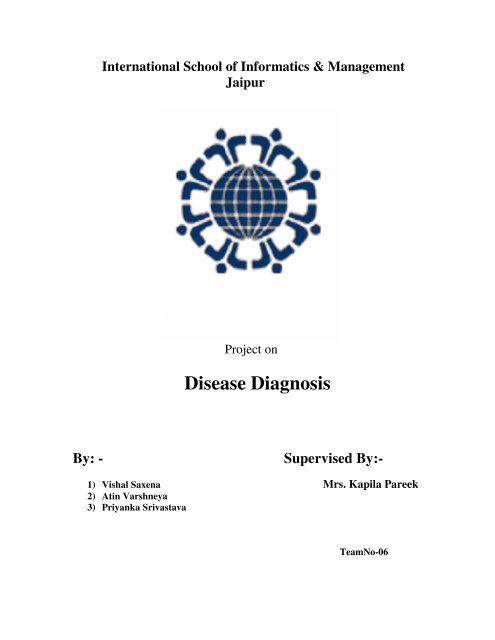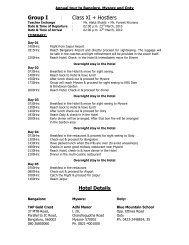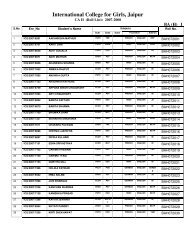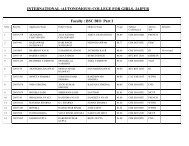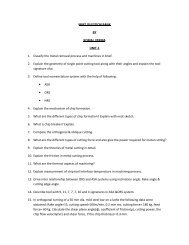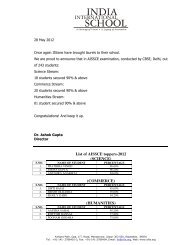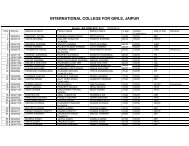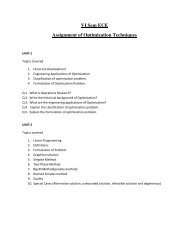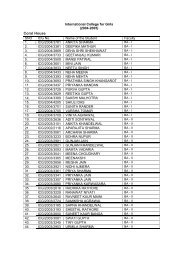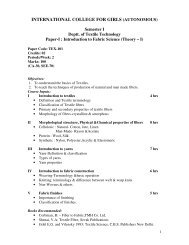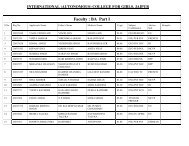Project-Disease Diagnosis System
Project-Disease Diagnosis System
Project-Disease Diagnosis System
You also want an ePaper? Increase the reach of your titles
YUMPU automatically turns print PDFs into web optimized ePapers that Google loves.
International School of Informatics & Management<br />
Jaipur<br />
<strong>Project</strong> on<br />
<strong>Disease</strong> <strong>Diagnosis</strong><br />
By: - Supervised By:-<br />
1) Vishal Saxena Mrs. Kapila Pareek<br />
2) Atin Varshneya<br />
3) Priyanka Srivastava<br />
TeamNo-06
CERTIFICATE<br />
This is to certify that this report embodies the original work<br />
done by Vishal Saxena, Atin Varshneya and Priyanka<br />
Srivastava during the project submission as a partial<br />
fulfillment of the requirement for the <strong>System</strong> Design <strong>Project</strong><br />
of Masters of computer Application IV semester, of the<br />
Rajasthan Technical University, Kota.<br />
Swati V. Chande<br />
Principal<br />
(MCA Department)<br />
International School Of<br />
Informatics and Management<br />
Mrs. Kapila Pareek<br />
Lecturer<br />
(MCA Department)<br />
International School<br />
Of Informatics and<br />
Management
ACKNOLEDGEMENT<br />
The satisfaction that accompanies the successful completion of any<br />
task would be incomplete without the mention of people whose<br />
ceaseless cooperation made it possible, whose constant guidance<br />
and encouragement crown all efforts with success.<br />
We are grateful to our project guide Mrs. Kapila Pareek mam for the<br />
guidance, inspiration and constructive suggestions that helpful us in<br />
the preparation and execution of this project.<br />
We would also express our thanks to our Friend Yogesh Jain and<br />
people who have helped in successful completion of the project.<br />
Vishal Saxena<br />
Atin Varshneya<br />
Priyanka Srivastava
� Synopsis:<br />
Contents<br />
Purpose<br />
Introduction<br />
Working of the system<br />
Assumption<br />
Constraints<br />
� Feasibility Report<br />
Description of existing system<br />
Disadvantages of existing system<br />
Input for the new system<br />
Output of the new system<br />
Economical feasibility<br />
Technical feasibility<br />
Behavioral feasibility<br />
� Benefits of Computerization<br />
� Goals of Proposed system<br />
� Alternative Solutions<br />
� Brief description of <strong>Disease</strong> <strong>Diagnosis</strong> system<br />
� Details of Hardware and Software’s used<br />
� <strong>System</strong> Maintenance<br />
� Data Flow Diagram<br />
� Data Dictionary
PURPOSE:-<br />
• To assist the doctor.<br />
• It reminds the possible diseases to the doctor on the basis of<br />
symptoms (to overcome human errors like diligence, versatile,<br />
tiredness)<br />
• Enable a patient to find out the diseases, when no other help is<br />
possible.<br />
INTRODUCTION :-<br />
It is an expert system which is use for simplifying the task of<br />
doctors. It is a system that checks a patient at initial level and<br />
suggests the possible diseases. It starts with asking about<br />
symptoms to the patient, if the system is able to name the disease<br />
then it provide the name and the corresponding medicines, If the<br />
system is not sure enough, It ask some queries to the patients, still<br />
of the system is not sure then it will display some test to the<br />
patient. On the basis of available cumulative information, the<br />
system will display the name and the prescribed medicines of the<br />
disease. This system not only simplifies task of the doctors but also<br />
helps the patients by providing initial medicines for small diseases<br />
in emergency.<br />
Software Requirements<br />
Front-end<br />
(For Coding) VB. Net<br />
(For Designing) VB. Net<br />
Back-end<br />
Structured Query Language (SQL)<br />
Oracle
Description :-<br />
USER<br />
REQUEST<br />
RESPONSE<br />
Working of the system<br />
User<br />
Interface<br />
Fig. :- Working of the <strong>System</strong><br />
QUERY<br />
(SQL)<br />
RESULT<br />
GENERATED<br />
According to the diagrams, it is a two tier architecture. We provide a form<br />
that shows a list of symptoms. From the listed symptoms, user have to select<br />
those that he/she have. On the basis of selected symptoms the system will<br />
generate related disease. If the information for the disease is not enough the<br />
system will show another form that contain some queries. On the basis of the<br />
information a query is generated and the data base responses to that query.<br />
DATA<br />
BASE
Assumptions:-<br />
• The user is assumed to have basic knowledge of computers.<br />
• The program will feature a simple point and click graphical<br />
Interfaces.<br />
• The user is assumed to give the system right information regarding<br />
the disease.<br />
• The user is assumed to use this system for the initial level of the<br />
disease but also go to the doctor.<br />
Constraints:-<br />
• Information’s are available for limited disease.<br />
• This system is not appropriate for complex diseases.<br />
• This is not appropriate for research work.
Description of Existing <strong>System</strong> :-<br />
FEASIBILITY REPORT<br />
• Our Existing system is a human being (Doctor himself). Who<br />
knows large number of diseases and their solutions. It takes<br />
decisions at the very same time when he identifies the disease.<br />
Disadvantages of Existing <strong>System</strong> :-<br />
• as our existing system is a human being he can suffering from<br />
following human errors :-<br />
1. Tiredness<br />
2. Memory limitations<br />
3. Both the doctor and the patient should be present.<br />
Input for the New <strong>System</strong> :-<br />
• It requires information only about the symptoms.<br />
• If required then also, the report of any test is given as an input.<br />
• Requires answers of some queries that the system ask.<br />
Output of the <strong>System</strong> :-<br />
• It gives us information about diseases.<br />
• If these is a possibility that a group of symptoms produce more<br />
than one disease then the system will display the name of all<br />
diseases, regarding to the symptoms.<br />
• It also give us the of possible medicines.
Feasibility study is a system proposal according to the work ability, impact<br />
on the organization, ability to meet users need and efficient use of resources.<br />
Three key considerations are involved in feasibility analysis, economical,<br />
technical & behavioral.<br />
Economical Feasibility:-<br />
The economical analysis of the present proposed system is necessary to<br />
evaluate if high investment of the system is beneficial. Actually the<br />
implementing changes for “<strong>Disease</strong> <strong>Diagnosis</strong>” are very minimal. It only<br />
needs window platform to run the program. The software is also not at all<br />
resource hungry.<br />
Technical Feasibility:-<br />
It is must that the proposed system is<br />
technically feasible in the organization. The existing system is manual and<br />
hence it is necessary to bring around awareness of the computer but this may<br />
not require an in-depth technical knowledge as the system developed is<br />
simple and easy to understand. The result obtain should be true in real time<br />
conditions. Then only the software can be used in Hospitals for checking<br />
purpose.<br />
Behavioral Feasibility:-<br />
Behavioral feasibility deals with the runtime performance of the<br />
software. The proposed system must score higher than the present in the<br />
behavioral study. The software should have end user in mind when the<br />
system is design. While designing software the programmer should be<br />
aware of the conditions, users knowledge, input, output, calculation etc.<br />
The software contains only a minimum number of bugs. Care should be<br />
also taken to avoid non working menus and buttons.
Benefits of Computerization<br />
A Compressive computer based system is proposed for IT application<br />
identified at various branches of the office. The summary of the new<br />
computerized system is as:<br />
1) Transparency:-The new online system will provide transparency in<br />
the system. All requisite details would be readily available on<br />
computer.<br />
2) Integration:- The important function of the office would be<br />
integrated through information interchange. The integration would<br />
lead to effective policy making planning and control.<br />
3) Better monitoring and control:- The staff would be able to devote<br />
more time in planning, monitoring and control. This would lead to<br />
better follow up and disposal of cases since required information<br />
would be available online and on time.<br />
4) Improved Efficiency:- Another important intangible benefit of<br />
computerization would be improved efficiency by way of systematic<br />
record keeping and timely generation of information and analysis.<br />
5) Optimum Utilization of Resources:- Manpower would now be<br />
utilized optimally and in the right direction. Other resources of the<br />
corporation would also be utilized in better way.
Goals of the proposed systems<br />
1. Planned approach towards working:- The working in the<br />
organization will be well planned and organized. The data will<br />
be stored properly in data stores, which will help in retrieval of<br />
information as well as its storage.<br />
2. Accuracy:- The level of accuracy in the proposed system will<br />
be higher. All operation would be done correctly and id ensures<br />
that whatever information is coming from the center is accurate.<br />
3. Reliability:- The reliability of the proposed system will be high<br />
due to the above stated reasons. The reason for the increased<br />
reliability of the system is that now there would be proper<br />
storage or information.<br />
4. No redundancy:- In the proposed system utmost care would be<br />
that no information is repeated anywhere ,in storage or<br />
otherwise. This would assure economic use of storage space<br />
and consistency in the data stored.<br />
5. Immediate Retrieval of Information:- The main objective of<br />
proposed system is to provide for a quick and efficient retrieval<br />
of information. Any type of information would be available<br />
whenever the user requires.<br />
6. Immediate Storage of Information:- In manual system there<br />
are many problems to store the largest amount of information.<br />
7. The system should be easy to operate and should be such that<br />
it can be developed within a short period of time and fit in the<br />
limited budget of the user.
Alternative Solution<br />
Online <strong>Disease</strong> <strong>Diagnosis</strong> <strong>System</strong>:-<br />
This system provides alternative solution for our <strong>System</strong>. It<br />
provides online storage/ updation and retrieval facilities (In context<br />
with diseases and medicines). This system promises very less or no<br />
paper work and also provide users the comfort of home.<br />
In this system every information stored and<br />
retrieve electronically that makes it effective and provide easy<br />
retrieval of medicine information with out searching here and<br />
there. The patient can take use of online DDS sitting at home and<br />
find medicines at the very same level.<br />
Online DDS is very useful for the patients as well as doctors<br />
because both are able to receive and provide information about<br />
diseases and medicines from a single place.
Brief Description of <strong>Disease</strong> <strong>Diagnosis</strong><br />
<strong>System</strong><br />
This system will provide all the information about diseases and<br />
medicines with the help of symptoms.<br />
Login form:-<br />
This Login form asks for the user name and password from the user<br />
at the first time when it starts. After giving correct user name and<br />
password, user will be able to enter in the system. Multiple users are<br />
possible.
Patient Information Form:-<br />
After LogIn, Patient Information is the second form to which user<br />
interact .This form basically ask for the user/patient details. The<br />
concept for using this form is to provide right medicine to the<br />
patient and to remember the blood group so that in near feature if<br />
there any requirement of blood the hospital that having this<br />
software can call that person.
Symptoms Form:-<br />
This form is basically for patient who select the symptoms that he<br />
or she have on the basis of which the doctors take decisions that<br />
what disease is suspected. Facility is provided to select the<br />
symptoms as well as to deselect the symptoms at the very same<br />
time in case if the patient selects any wrong symptom.
<strong>Disease</strong> And Medicines Description Form:-<br />
This form is use to show the name of the disease and the name of<br />
the medicines regarding to that disease. After receiving the name<br />
of the medicines the user have to click Ok button that takes the<br />
user to the “symptoms” form. Take an example that if a patient has<br />
malaria then this form provides the name of the disease as well as<br />
the name of the medicines according to the given form.
Quote By The Doctor:-<br />
Some time diseases are too complicated. In such case doctor has to<br />
ask some other question to the patients that helps the doctor to find<br />
out the diseases that are not clear. This system provides facilities<br />
for that, many input boxes are given to solve this purpose. The<br />
questions are simple that have “yes/no” type answers.
Warning Form:-<br />
This form is used in such cases when the doctor required any blood<br />
test report to detect some disease. This form gives warning about<br />
the suspected disease to the patient and asks for blood test report.<br />
This blood test report is then tested by the doctor and after clicking<br />
on the ok button the list of suspected diseases is shown.
Form For <strong>Disease</strong>s That Required Blood Test:-<br />
After the blood test report the suspected disease is selected from<br />
this form by selecting any of the option button and when we click<br />
ok button then it display the name of the disease as well as the list<br />
of the medicines for the given disease.
Blood Test Based <strong>Disease</strong>s and medicine information:-<br />
This again the same form that gives us the information about the<br />
disease as well as the medicines for the diseases. For an example, in<br />
the blood test report if the doctor found that the patient has viral then<br />
this form gives the name of the disease as well as the medicines not<br />
only for viral as well as all other minor diseases like cold, weakness<br />
etc..
Details of Hardware & Software used:-<br />
Hardware and Software used while developing this project are:<br />
Hardware : Windows XP<br />
Software for Front End : VB.Net, HTML<br />
Software used for : Microsoft World 2003<br />
Documentation<br />
RDBMS : MS Access<br />
Minimum Hardware<br />
Configuration : Intel Pentium<br />
Processor 256 MB<br />
RAM Intel 810 chipset<br />
Colored Monitor<br />
Resolution 800 x 600
<strong>System</strong> Maintenance<br />
Maintenance is enigma of the system development analysts and<br />
programmers spend far more time maintaining programs and packages than<br />
writing them. Maintenance accounts for 60-80% of the total system<br />
development cost incurred. The problem in maintenance occurs largely<br />
because software is handmade product designed in adhoc fashion with new<br />
standards. Poor documentation makes maintenance of the programs even<br />
more difficult. The more careful is the system though out and developed,<br />
with attention paid to external influence over reasonable lifetime, the less id<br />
the maintenance required.<br />
Maintenance has been classified as:<br />
• Corrective maintenance<br />
• Adaptive maintenance<br />
• Perfective maintenance<br />
Corrective maintenance<br />
This means repairing the processing and performance failure or making<br />
because of previously uncorrected problems or false assumptions.<br />
Adaptive maintenance<br />
This means changing the program funct6ions as and when required.<br />
Perfective maintenance<br />
This means enhancing the performance or modifying the programs to<br />
respond to the user’s additional or time –to –time changing needs.
User/Doctor<br />
(2)<br />
Check the<br />
Username &<br />
Password<br />
(Authentication)<br />
LogIn<br />
Data Flow Diagram (DFD):-<br />
(4)<br />
(1) (6)<br />
Login in<br />
to the sys-<br />
-tem.<br />
<strong>Disease</strong><br />
<strong>Diagnosis</strong><br />
<strong>System</strong><br />
Provide<br />
Symptoms<br />
Patient<br />
Give the name<br />
of disease &<br />
medicines to<br />
the patient<br />
(7)<br />
Receive<br />
Patient<br />
Information<br />
Check<br />
the<br />
disease<br />
on the basis<br />
of Symptoms<br />
(3)<br />
PatientInfo<br />
(5)<br />
<strong>Disease</strong><br />
Patient Information
Data Dictionary<br />
Database Design:- In DDS we Design data with the help of three<br />
tables:<br />
• Login<br />
• <strong>Disease</strong><br />
• PatientInfo<br />
Login Table:- It stores information about the user name and password .<br />
More than one user is possible. The design of the table and view of the<br />
table of as follows-<br />
Design:-<br />
View:-
PatientInfo:- This table stores all information about a patient that come<br />
for check up. The Design and View of the table are as follows-<br />
Design:-<br />
View:-
<strong>Disease</strong>:- This table is used to store information about the diseases that<br />
a patient have (on the basis of symptoms) as well as name of the<br />
medicines for the diseases. The design and view of the table is given as-<br />
Design:-<br />
View:-
SCOPE OF FUTURE APPLICATION<br />
This application can be easily implemented under various situations. We<br />
can add new features as and when we require. Reusability is possible as<br />
and when require in this application. There is flexibility in all the modules.<br />
SOFTWARE SCOPE:<br />
• Extensibility: This software is extendable in ways that its original<br />
developers may not expect. The following principles enhance<br />
extensibility like hide data structure, avoid traversing multiple links<br />
or methods, avoid case statements on object type and distinguish<br />
public and private operations.<br />
• Reusability: Reusability is possible as and when require in this<br />
application. We can update it next version. Reusable software reduces<br />
design, coding and testing cost by amortizing effort over several<br />
designs. Reducing the amount of code also simplifies understanding,<br />
which increases the likelihood that the code is correct. We follow up<br />
both types of reusability: Sharing of newly written code within a<br />
project and reuse of previously written code on new projects.<br />
• Understandability: A method is understandable if someone other than the<br />
creator of the method can understand the code (as well as the creator<br />
after a time lapse). We use the method, which small and coherent<br />
helps to accomplish this.<br />
• Cost-effectiveness: Its cost is under the budget and make within given<br />
time period. It is desirable to aim for a system with a minimum cost<br />
subject to the condition that it must satisfy the entire requirement.
Scope of this document is to put down the requirements, clearly<br />
identifying the information needed by the user, the source of the information<br />
and outputs expected from the system.


